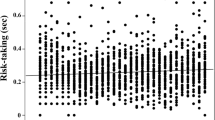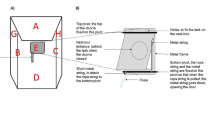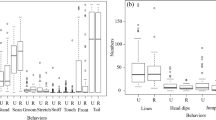Abstract
The trap tube is a classic test of causal reasoning abilities in animals in the physical domain. Recently, a modified version of this task improved its diagnostic capacity and allowed testing of non-tool-using animals. We used this modified two-trap tube task to compare the cognition of two Darwin’s finch species: the woodpecker finch, Cactospiza pallida, a tool-using species, and the small tree finch, Camarhynchus parvulus, a closely related non-tool-using species. Not all woodpecker finches use tools in nature, and we therefore also tested non-tool-using individuals to assess the effect of experience on trap tube performance. No small tree finches and only two non-tool-using woodpecker finches solved the initial task which was operated using a pre-inserted piston. One tool-using woodpecker finch solved the task when allowed to use its own tool instead of the pre-inserted piston. The fact that none of these subjects transferred their knowledge when the features of the task changed, suggests that in this species, neither experience using tools nor the genetic composition of a tool-user are associated with the general physical cognitive skills required to solve the trap tube task.



Similar content being viewed by others
References
Bluff LA, Weir AAS, Rutz C, Wimpenny JH, Kacelnik A (2007) Tool-related cognition in New Caledonian crows. Comp Cogn Behav Rev 2:1–2
Eibl-Eibesfeldt I (1961) Über den Werkzeuggebrauch des Spechtfinken Camarhynchus pallidus (Scalter und Salvin). Z Tierpsychol 18:343–346
Hauser MD, Santos LR, Spaepen GM, Pearson HE (2002) Problem solving, inhibition and domain-specific experience: experiments on cottontop tamarins, Saguinus oedipus. Anim Behav 64(3):387–396. doi:10.1006/anbe.2002.3066
Lefebvre L, Nicolakakis N, Boire D (2002) Tools and brains in birds. Behaviour 139(7):939–973. doi:10.1163/156853902320387918
Liedtke J, Werdenich D, Gajdon G, Huber L, Wanker R (2010) Big brains are not enough: performance of three parrot species in the trap-tube paradigm. Anim Cogn 14:1–7. doi:10.1007/s10071-010-0347-4
Limongelli L, Boysen ST, Visalberghi E (1995) Comprehension of cause-effect relations in a tool-using task by chimpanzees (Pan troglodytes). J Comp Psychol 109(1):18–26
Martin-Ordas G, Call J, Colmenares F (2008) Tubes, tables and traps: great apes solve two functionally equivalent trap tasks but show no evidence of transfer across tasks. Anim Cogn 11(3):423–430. doi:10.1007/s10071-007-0132-1
Mulcahy N, Call J (2006) How great apes perform on a modified trap-tube task. Anim Cogn 9(3):193–199
Penn DC, Povinelli DJ (2007) Causal cognition in human and nonhuman animals: a comparative, critical review. Annu Rev Psychol 58(1):97–118. doi:10.1146/annurev.psych.58.110405.085555
Penn DC, Holyoak KJ, Povinelli DJ (2008) Darwin’s mistake: explaining the discontinuity between human and nonhuman minds. Behav Brain Sci 31(2):109–178
Povinelli DJ (2000) Folk physics for apes. Oxford University Press, Oxford
Reader SM, Laland KN (2002) Social intelligence, innovation, and enhanced brain size in primates. Proc Natl Acad Sci USA 99(7):4436–4441. doi:10.1073/pnas.062041299
Seed AM, Tebbich S, Emery NJ, Clayton NS (2006) Investigating physical cognition in rooks, Corvus frugilegus. Curr Biol 16(7):697–701. doi:10.1016/j.cub.2006.02.066
Seed AM, Call J, Emery NJ, Clayton NS (2009) Chimpanzees solve the trap problem when the confound of tool-use is removed. J Exp Psychol Anim Behav Process 35(1):23–34. doi:10.1037/a0012925
Silva FJ, Page DM, Silva KM (2005) Methodological-conceptual problems in the study of chimpanzees’ folk physics: how studies with adult humans can help. Learn Behav 33:47–58
Taylor AH, Hunt GR, Medina FS, Gray RD (2009a) Do New Caledonian crows solve physical problems through causal reasoning? Proc R Soc B 276(1655):247–254. doi:10.1098/rspb.2008.1107
Taylor AH, Roberts R, Hunt G, Gray R (2009b) Causal reasoning in New Caledonian crows: ruling out spatial analogies and sampling error. Commun Integr Biol 2(4):311–312
Tebbich S, Bshary R (2004) Cognitive abilities related to tool use in the woodpecker finch, Cactospiza pallida. Anim Behav 67(4):689–697. doi:10.1016/j.anbehav.2003.08.003
Tebbich S, Taborsky M, Fessl B, Blomqvist D (2001) Do woodpecker finches acquire tool-use by social learning? Proc R Soc Lond B 268(1482):2189–2193. doi:10.1098/rspb.2001.1738
Tebbich S, Taborsky M, Fessl B, Dvorak M (2002) The ecology of tool-use in the woodpecker finch (Cactospiza pallida). Ecol Lett 5(5):656–664. doi:10.1046/j.1461-0248.2002.00370.x
Tebbich S, Seed AM, Emery NJ, Clayton NS (2007) Non-tool-using rooks, Corvus frugilegus, solve the trap-tube problem. Anim Cogn 10(2):225–231. doi:10.1007/s10071-006-0061-4
Tebbich S, Sterelny K, Teschke I (2010) The tale of the finch: adaptive radiation and behavioural flexibility. Philos Trans R Soc B 365(1543):1099–1109. doi:10.1098/rstb.2009.0291
Visalberghi E, Limongelli L (1994) Lack of comprehension of cause-effect relations in tool-using capuchin monkeys (Cebus apella). J Comp Psychol 108(1):15–22
Visalberghi E, Tomasello M (1998) Primate causal understanding in the physical and psychological domains. Behav Process 42(2–3):189–203. doi:10.1016/S0376-6357(97)00076-4
Acknowledgments
IT was supported by the German research foundation (DFG, Project Nr. TE628/1-1) and ST by the Austrian Science Fund (FWF, Project Nr. V95-B17). The experiments comply with the current laws of the country in which they were carried out. We are thankful to the Charles Darwin Research Station for support and TAME for reduced ticket fares. We are also grateful to Dr. Birgit Fessl for support in all facets of this study. Caroline Raby, Viviana Morales, Mari Cruz Jaramillo, Tania Quisingo Chiza, Paola Buitron Lopez, and Eduardo Sandoval provided valuable field assistance and help with experiments. Patrick Meidl provided vital support in organizing vast amounts of data. Thanks to Andy Burnley for constructing experimental apparatus and to Sue-Anne Zollinger for helping to make the figure depicting the experimental apparatus.
Author information
Authors and Affiliations
Corresponding author
Electronic supplementary material
Below is the link to the electronic supplementary material.
Rights and permissions
About this article
Cite this article
Teschke, I., Tebbich, S. Physical cognition and tool-use: performance of Darwin’s finches in the two-trap tube task. Anim Cogn 14, 555–563 (2011). https://doi.org/10.1007/s10071-011-0390-9
Received:
Revised:
Accepted:
Published:
Issue Date:
DOI: https://doi.org/10.1007/s10071-011-0390-9




